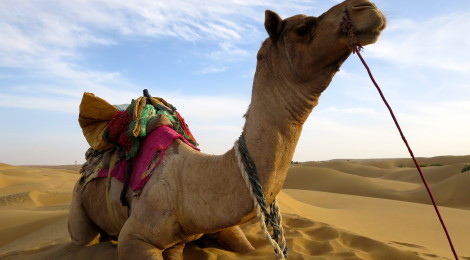
What Desert Dreams May Come
It is 5am when the Jaisalmer Express pulls into the station and we stumble out into the darkness. Amor, a youthful ambassador from our budget hotel approaches us holding a crumpled paper sign with my name on it, spelled out in magic marker and embellished with royal swirls. In Jaisalmer, even the cheapest lodgings offers free station pickups to make sure that their would be guests aren’t intercepted by the throng of outlaw drivers lying in wait outside the station, willing to use any version of the truth necessary to wrangle arriving tourists away to competing hotels on commission. We walk past the auto-rickshaw privateers and pile our bags into the back of Amor’s 4×4. He cranks up the stereo and the back seat vibrates to a bhangra beat. We take off in the dark at a speed that erroneously suggests the deserted streets are pothole-free. I turn around and watch the station disappear out the rear window in our dust trail. Welcome to India’s Wild West.
It is not yet dawn when we reach the Hotel Renuka. Amor charismatically tells us the short version of his life story as he checks us in. This is a good hotel, he assures us. His family is large and poor. He never went to school. At 14 he landed a coveted job at the hotel as a cleaning boy and it changed the trajectory of his life. He cleaned rooms on his hands and knees for three years while picking up English and pleasantries in other tourist languages. Slowly his responsibilities grew to include helping check guests in and make train station pickups. Now, at age 22, his primary responsibility is leading guests on camel safaris in the Thar Desert. The salary he earns is helping to lift his parents out of poverty. “This hotel is my university,” Amor beams with his hand on his heart, “and you are my teachers.”
Rested and freshened, we make our way through the streets of the Golden City toward the fort that stands tenaciously on the south edge of town like a sandcastle unwilling to succumb to the tides of modernity. Inside the fort gates, however, though the alleyways and architecture are atmospheric, signs of local life are as scarce as wells in a desert. Instead, every sandstone wall displays patchwork bedspreads, camel drive t-shirts and sparkly handbags, and every doorway contains a tout beckoning us up to a rooftop restaurant with promises of “cold beer,” “real Italian coffee” and “multi-culture cuisine.” Though we’re visiting at an ideal time of year before the rains and the heat, the gift shops inside the fort far outnumber the tourists. We’ve only been in town for half a day and I’m already itching to hightail it out of Dodge. Have we really just traveled across North India to reach a sandstone souvenir stand?
Once a major Indian gateway stop on eastern trade routes, today there is an economic tension in Jaisalmer between the tourism industry, inspired by exotic desert fantasies, and India’s real and ongoing military presence along the Pakistani boarder. The wind turbines that now share the desert with the camel safaris power security lights and cameras along the frontier.
“The number of tourists is down,” we’re told, back at the hotel by Srenda, the congenial cook who has run the rooftop restaurant for the past 20 years. It’s a theme we’ve heard repeated throughout our time in Rajasthan. Despite a prime minister actively working to reduce national barriers to entry with eased visa requirements, the last few years have been slow. “Not just for hotels and restaurants,” our chef explains, “it trickles down to the chapatti flour grinder, to the chai seller. This is a small community.”
Local theories for the tourism dip range from Brazil’s recent Olympic and World Cup prominence, to a series of high profile rapes in India that have made international news, beginning with the gang rape and murder of a 23-year-old female New Delhi student in 2012. I was in India in December at the time of the 2012 rape. Huge crowds took to the streets in protest, and it seemed like the country might be on the verge of a women’s rights revolution. Today the story is back in the world spotlight due to the release of a controversial new BBC documentary profiling the case, and the Indian government’s regrettable decision this past week to ban the broadcast of “India’s Daughter” inside the country.
Back on the rooftop, my mood is shifting. The view of the fort is hypnotic, the chef’s cooking is authentic, and Amor has reappeared, all jokes and smiles. Down the block, a local wedding party DJ tests the sound system in an open-air venue, and Amor and I lean over the railing to spy on the festivities. “This is a bad wedding,” he declares, straight-faced, “because they have not invited us.” The chef stokes his wood fire. Amor shows off his Michael Jackson moves to the wedding soundtrack. With the fort as a backdrop and the moon on the rise, the rooftop of the Hotel Renuka feels like a watchtower looking down on the borderlands between Jaisalmer, the storybook fantasy and Jaisalmer, the desert community. “I do not need to travel,” Amor shares from our perch. “I learn about different places, beautiful places all over the world from the people who visit here, and at night I go there in my dreams.” Perhaps the local well in this outpost runs deeper than I thought. In the morning I vow to look at Jaisalmer with fresh eyes.
At the Chandan Shree Restaurant, we wash our hands outside and sit among merchants and military officers eating Rajasthani thalis. The tips of their mustaches are waxed and curled. As we work our way through the local vegetarian specialties on the menu, our waiter brings us a rustic, millet flour roti to try, perfumed with smoke from an open flame. “Only in Rajasthan,” he winks. On a walk to the central post office I make a study of the men. Most of them still don traditional turbans and wear thick, tan shawls or swaths of block-printed cotton about their shoulders that evoke images of cold desert nights. Originally we had no plans to ride a camel during our stay, but there is something about these scarves that whispers in my ear: if you don’t see more of the desert before you go, you will have missed something important.
Amor, who has taken to calling us Auntie and Uncle, is delighted, and begins making preparations. After lunch the next day, we climb into the 4×4 along with a young Italian couple who are traveling after completing a month of volunteer work in Calcutta. Amor drives us out of town with one hand while shopping the stereo for perfect road trip music with the other.
We stop at a desert oasis to skip stones across the water’s surface, and at a Brahman ghost town, abandoned three hundred years ago when a lusty Maharaja tried to lay claim to one of the village girls. Instead of handing her over or facing certain death, the residents chose to pack up the whole town and leave. The fight for India’s daughters, it seems, has been going on for much longer than headlines and documentaries might have us believe.
The Italians are in a panic. Somewhere between the oasis and the ghost town their bright orange iPhone is lost. Amor spurs the 4×4 and we retrace our steps at a gallop. At first we assume the phone has been mislaid, but when the Italians discover rupees have gone missing as well we know someone must have gone through the bag they left in the car at the ghost town. Amor puts on his vigilante hat, exchanges strong words with the site attendants, makes a series of cell phone calls and incentivizes the local police to take immediate action. Impromptu arrangements are made with a jeep driver from a neighboring hotel to take Chris and me to meet our camel driver while Amor and the Italians follow the iTrail while it’s still hot. Watching the response, it is clear the afternoon’s caper is not a common occurrence. I can almost hear them all thinking in unison as they work together to round up a happy ending: the last thing the Jaisalmer tourism industry needs now is a petty crime wave.
It is just the two of us on the camel ride, led across the dunes by a father and his leggy ten and fifteen year old sons. “Hold on tight and lean back” are the only instructions I am given or need, as my camel gets his legs under him and hoists me up above the dunes. It may be touristy to ride a camel for an hour and a half along the fringe of the Thar, but there is something undeniably real about the jerk of the camel as it stands, the spread of its hooves on the sand as it walks and the forward rocking motion of its stride that connects me through my tailbone to centuries of desert dwellers. Alone on the dunes with nothing in front of me but the unadorned neck and head of my camel, the tassels of the camel driver’s scarf and the rolling dunes, I feel further away from the rest of the world than at any other time on this trip.
We make camp in a quiet spot just before sunset. Dung beetles emerge from divots and leave lonely trails on the surface of the sand. Dogs appear and noiselessly watch as the camp cook puts a mutton stew on to simmer. Suddenly, rising up over a dune, Amor reappears, victorious, with the giddy Italians whose phone and cash were astonishingly retrieved after the chase led to the impoverished village home of a pair of first-time offending boys and their humiliated father. The whole ordeal has been resolved so quickly that, at first sight, they appear as a mirage.
The sky darkens and the air turns cool. I sit in the blackness on a blanket near the fire watching the cook shape and grill roti by hand. The stew is earthy and earnest. The dogs, now announced only by the occasional flash of the embers reflected in their eyes, keep a silent vigil, praying for bones as the empty plates are collected.
I lean back on my blanket staring at the constellations. As my eyes slowly adjust from firelight to starlight, I become aware of a dog in the dark, just behind my shoulder. It is silhouetted in profile with its head tilted downward against the starry sky. The dog and I are both calm and still. It wishes me no harm. All at once I am reminded of Henri Rousseau’s painting of The Sleeping Gypsy, an image that first captured my imagination as a girl, transporting me to a dark desert and filling my dreams with wanderlust. Lying on my side in the sand with this patient carnivore watching over me, my dream and living worlds converge.
Amor is right: no one with imagination needs to travel to see the world. I have been journeying in my mind’s eye to this exotic camp in the dunes for decades. Never have I been more grateful for the gift of an active imagination, or more humbled by the privilege that relative wealth provides to physically travel to borderlands, like Jaisalmer, that are still wild.
To sleep, perchance to dream,
Alison
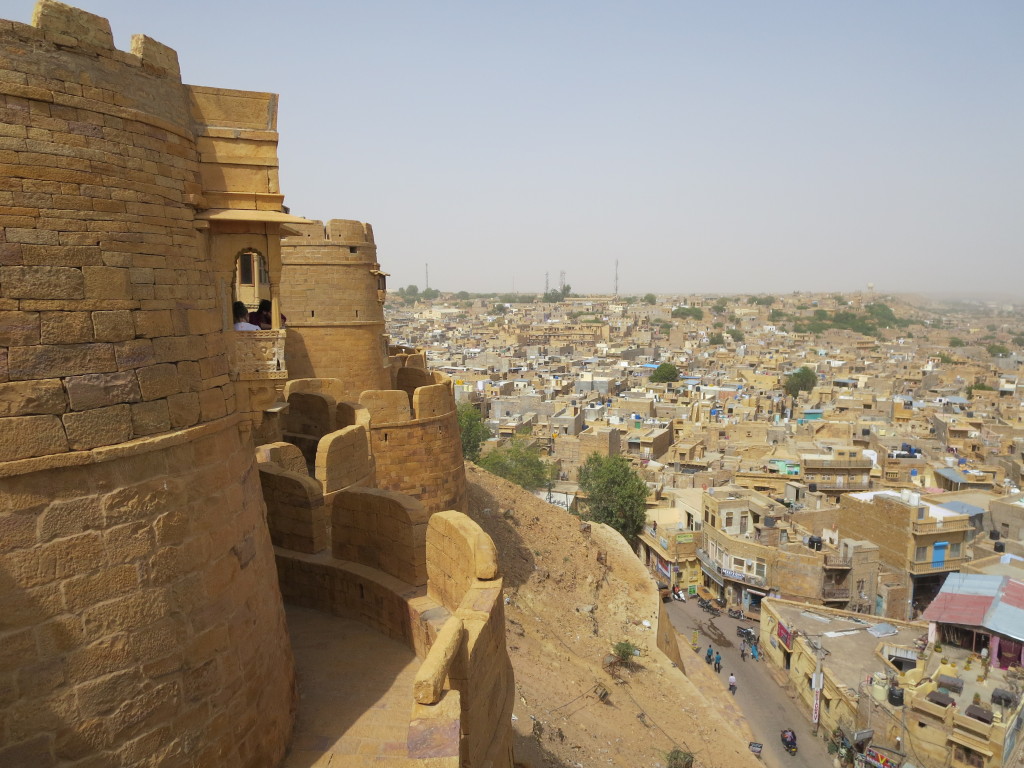
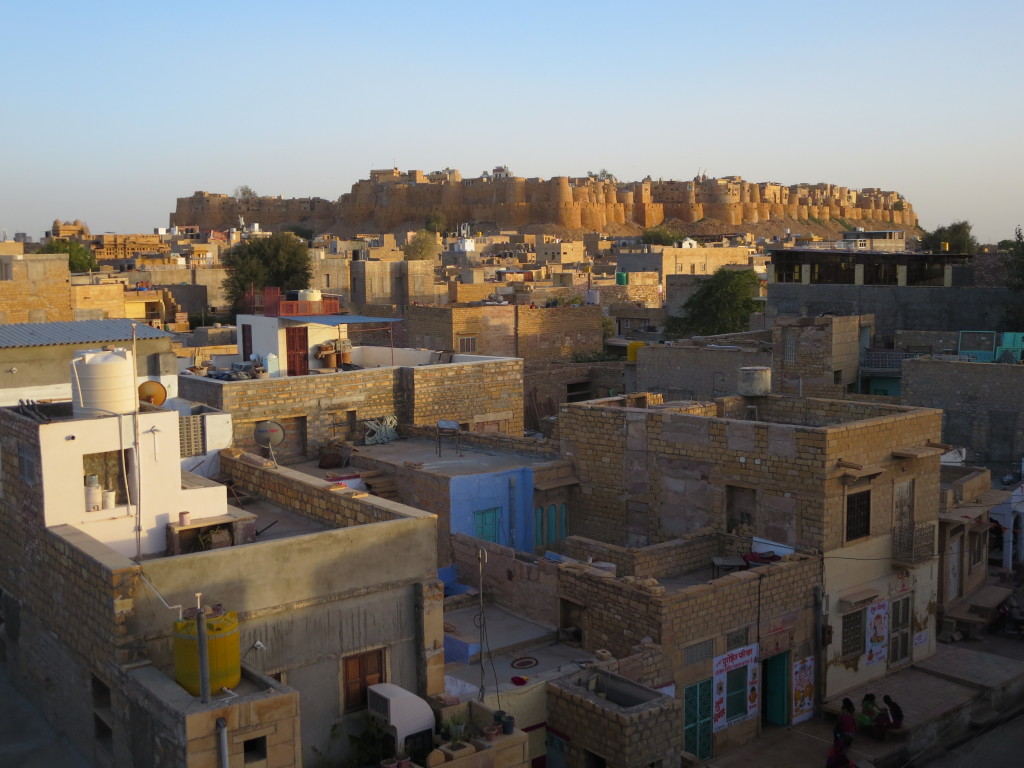


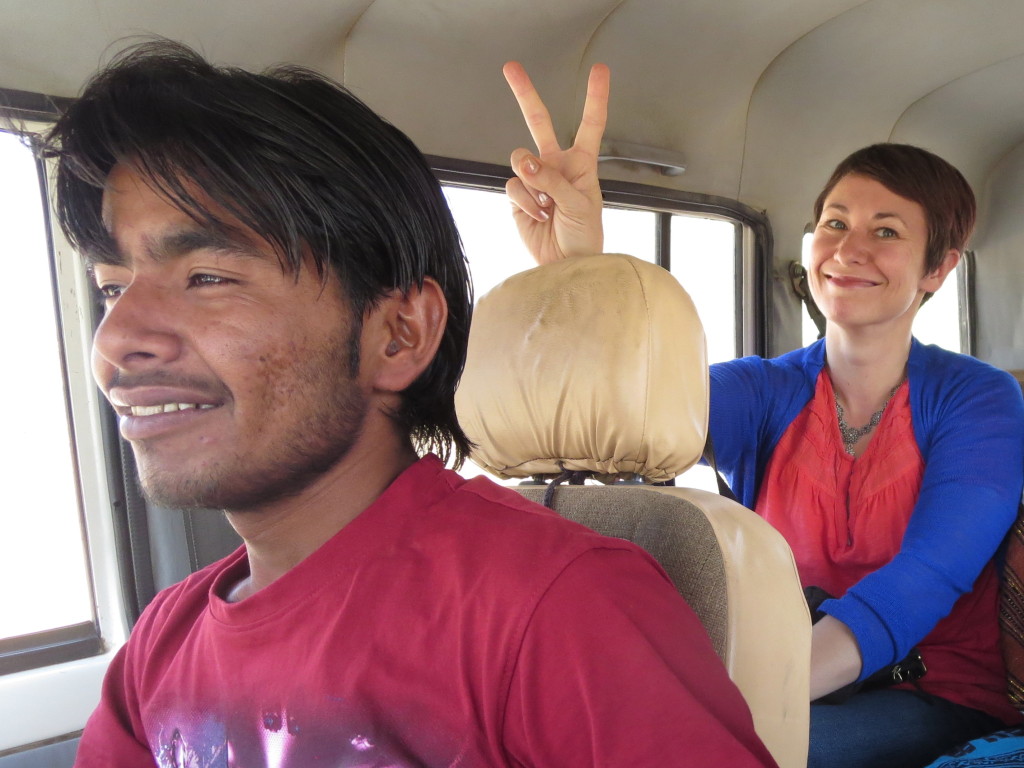


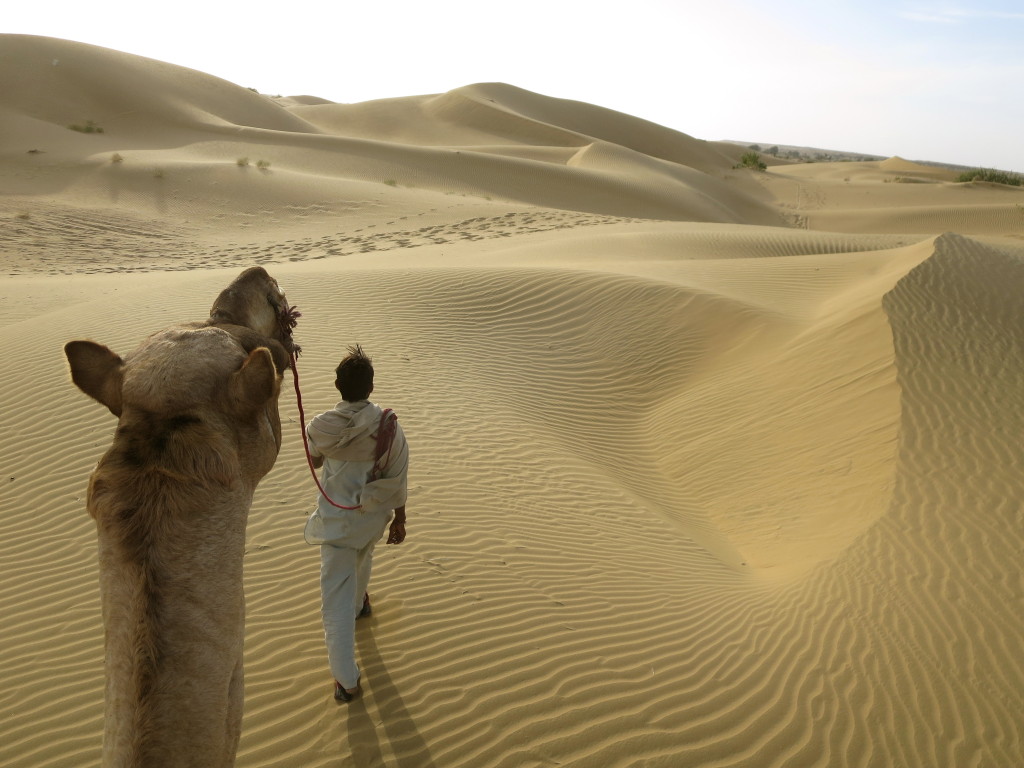
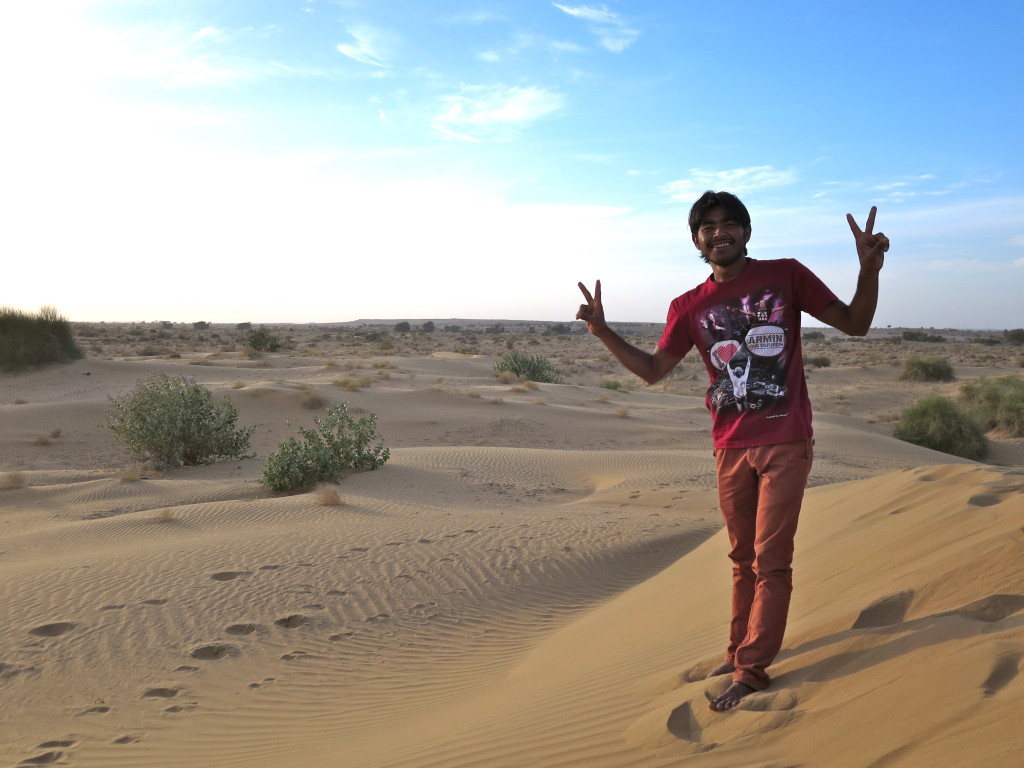

A very perceptive post.
Alison, my intrepid and happy wanderer,
Amor! What a perfect name for the hero of this Wild West camel cowboy tale! He is the embodiment of the truth that one person with integrity, vision, and humility can indeed make a positive difference in the world and touch many lives and hearts. So here’s to Amor, and sweet gypsy dreams by a desert fire.
Please change the last word in the first sentence of my post from “hero” to “tale”. I accidentally pressed the POST COMMENT button before editing.
Consider it done, Mama. XXOO Rosebud.